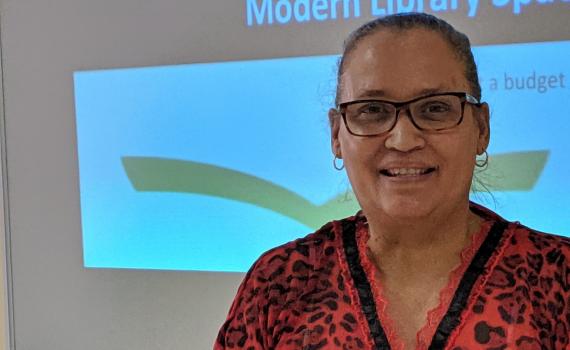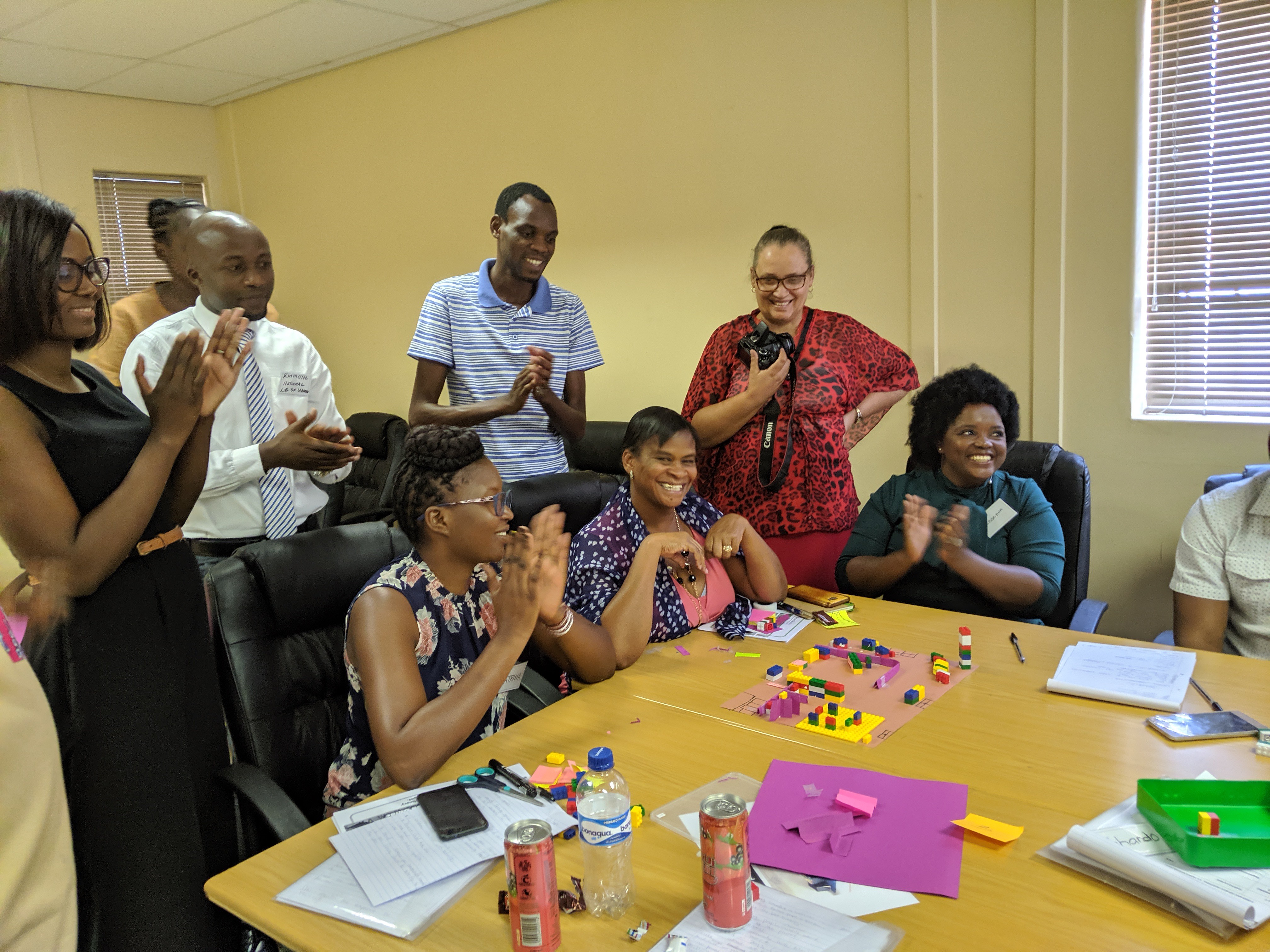
In 2018, the EIFL Public Library Innovation Programme (EIFL-PLIP) and the Namibia Library and Archives Service (NLAS), which leads a network of 66 public libraries, staffed by over 260 librarians, entered into partnership to strengthen continuous professional development of public librarians in Namibia. The partnership developed the skills and knowledge of 16 talented public librarians, positioning them to become expert trainers for their colleagues. EIFL asked Aletta Dunn, Chief Librarian for Public Libraries under the NLAS, and coordinator of the partnership, about how the programme is changing librarianship and library services in Namibia.
In your view, what was the main benefit of the partnership with EIFL-PLIP and the training of trainers programme?
Firstly, the partnership has given us a cohort of local trainers with excellent training skills, so we can now conduct our own training, here in Namibia. Our trainers can train other librarians to be trainers, so our pool of internal trainers will grow. They have already trained a total of 84 librarians in cascade training sessions, conducted for small groups in different regions. The topics covered include Internet Searching and E-Resources; Advocacy and Communications; Performance and Outcome Evaluation; Design Thinking and Project Management; Advanced ICT Skills and Library Spaces.
The feedback has been really positive. We conducted a survey of librarians who attended the cascade training - and 60% said they were actively passing on their skills to their colleagues, as well as training community members to use ICT for tasks like designing posters, writing CVs, internet searching, and accessing e-resources like Google Scholar and EBSCO host.
The trainees complimented the trainers for being able to simplify concepts and incorporate practical local examples into training, and 88% said the topics learnt were relevant to library service delivery. We had more cascade training planned for our new trainers, but we had to stop at the end of March, when the government introduced a national lockdown to restrict the spread of COVID-19.
 Secondly, the training has built the trainers’ leadership skills, and they are also passing these skills on. As a result, more of our librarians are initiating action locally. For example, a librarian from Omaruru Public Library wrote a proposal to the Ministry of Safety and received 10 computers for the local prison. Another librarian, from Mariental Public Library, has written and sent out a proposal in the amount of 2.5 million Namibian dollars (about 168,000 USD) to expand the library. This is a big change - our librarians used to believe NLAS headquarters was responsible for fundraising and partnerships.
Secondly, the training has built the trainers’ leadership skills, and they are also passing these skills on. As a result, more of our librarians are initiating action locally. For example, a librarian from Omaruru Public Library wrote a proposal to the Ministry of Safety and received 10 computers for the local prison. Another librarian, from Mariental Public Library, has written and sent out a proposal in the amount of 2.5 million Namibian dollars (about 168,000 USD) to expand the library. This is a big change - our librarians used to believe NLAS headquarters was responsible for fundraising and partnerships.
The final goal of the partnership is to stimulate service innovation and to build ICT skills in communities, and I believe we have achieved this. Our trainers and their trainees are overflowing with ideas - and some have already introduced them. Otjomuise Public Library now has an interactive WhatsApp group for library users. Ten of our public libraries are demonstrating a reading app to teachers and students at local schools. Omaheke Public Library is organizing training for street children. Koes Public Library now has a women’s group that gathers once a week to discuss issues affecting women and families.
Unfortunately, with COVID-19 we have not had much time - but there is new energy and spirit in our libraries as a result of the EIFL-NLAS partnership.
What is the situation in relation to COVID-19 now?
We reopened our libraries on 5 May. NLAS distributed hand sanitizing equipment and information about safety in re-opening, and most of our libraries are now working, but with limits on how many people can be in the library at one time. These limits are essential, because some of our libraries are really tiny - our smallest, Nkurenkuru Public Library in Kavango West Region, has just one room, 8 metres x 5 metres.
One service we were able to continue throughout the lockdown was internet access. Libraries with wireless kept their internet on 24/7 so that people could connect near the buildings. Even now, while we have to limit numbers, we have people with smartphones and laptops using the internet outside, day and night.
How did this training programme compare with your previous experiences of training?
The key is that the training is interactive and practical, and so the trainees are eager to go back to their libraries, share their new skills and knowledge, and practise what they have learnt. The subject modules were very relevant. The module on advanced ICT skills has opened up a whole new world for our libraries. When our internet is not working, we now know how to use mobile phones to get users active. We are using QR codes to access newspaper articles, and our internet search and e-resources skills have improved. We can also train people in our communities in advanced ICT, and expect this will be in high demand.
The module on library spaces and design thinking was inspiring. Most of our libraries are in old houses or classrooms. After the training, several libraries sent us plans for creating additional space without tearing down walls, which is costly and takes time because permission is needed.
Our trainers, and the librarians they have trained, have developed strong presentation skills. Before the training I observed that one of our trainers could not even stand up and introduce herself in a comfortable way. Now she is relaxed, able to present to any group, without fear. There is a new dimension to her librarianship.
When our trainers were asked to adapt what they had learnt to make it relevant for training in Namibia, they were amazed. Too often we learn about what is happening in other countries - but when you learn about your own country, and your own situation, you make it your own.
What plans do you have for the local trainers in future?
We plan to ask each of our new trainers to identify the training needs of their immediate colleagues and other librarians in their areas, and to submit a training plan.
We are also writing an article about the EIFL-PLIP training for the national newspaper, to make people aware of our new training skills.
Even before marketing we have had requests for training from other government departments. The road authorities have asked us for training in Advocacy and Communications, and the prisons department wants us to train officials, wardens and inmates on how to use ICT. I can see our 16 trainers will be working hard!
Is there anything that you particularly disliked about the EIFL-PLIP training of trainers programme?
No - keep it as it is. The presenters knew their content; their presentation styles were interactive. There was group work and team work. Everyone had to be involved - even me. I was supposed to be an observer - but I could not resist joining in!
Any advice do you have for library authorities in other countries that are considering partnering with EIFL-PLIP on a similar programme?
Just do it! The content is just right, and the EIFL team will work with you to adapt the content for libraries in your country. You will need to be organized and committed to really benefit from the programme - but it is worth it, professionally and financially.
At NLAS, we cannot thank EIFL enough for this opportunity. It has changed our vision for the future.
SHARE / PRINT







